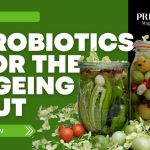Is Gut Health the New Target in Anti-Ageing?
Growing Older, Growing Wiser
Being born in 1965, I have had the unique privilege of growing older alongside Singapore every step of the way. Having recently turned 55, I am now officially a citizen senior enough to access my own retirement CPF savings. I am grateful that I remain in good health, mentally alert, and still have the sense of humour to enjoy the occasional back-handed compliment of “you look good for your age.”
Singapore has matured beautifully as well. Our infrastructure is strong, and our governance remains politically and economically sound. Recent reports show that Singapore now leads the world in longevity, with an average life expectancy of 84.8 years — an increase of 15 years since 1970.
However, our ageing population also brings challenges that we must manage proactively and plan for well ahead of time.
Why Healthy Ageing Matters
As people grow older, they face a higher risk of long-term health conditions. Longevity has little value if it comes with dementia, disability, or disease. The good news is that, just as successful nation-building depends on careful planning, healthy ageing is not random or out of our control.
While eternal youth remains a dream, ageing well is achievable when we understand the biological mechanisms that influence the process.
Understanding the Ageing Process
Ageing affects almost every system in the body — physiological, genetic, metabolic, and immune. Genetic pathways and chemical processes control how our bodies change with time, causing gradual loss of strength and function.
Much of what we now know about ageing comes from a simple organism often used in biological research: Caenorhabditis elegans, a tiny 1 mm transparent worm whose entire life cycle can be observed in two to three weeks.
Researchers studying this worm found that many signs of ageing start in the gut. Treatments that extend its lifespan usually do so by protecting its intestinal function. When scientists fed the worms different strains of gut bacteria, some of those bacteria produced substances that stimulated mitochondria — the energy centres of cells — and helped the worms live longer. Others protected against tumour growth and reduced the accumulation of amyloid-beta, the compound linked to Alzheimer’s disease.
This raises an important question: could gastrointestinal ageing also drive decline in humans? Can the bacteria living in our gut really influence how we age?
The Importance of Gut Health in Ageing
Only about 43 percent of the cells in our body are human. The remaining 39 trillion are microbes that live mainly in our gut and on our skin. These microscopic partners form the microbiota — a community that supports health and balance.
From birth, our gut fills with beneficial bacteria. Their composition and stability change as we age, shaped by diet, stress, and lifestyle. A fibre-rich diet helps these good bacteria thrive. They feed on undigested fibre (prebiotics) and create short-chain fatty acids — natural compounds that fuel gut-lining cells and strengthen the digestive barrier.
A strong gut barrier prevents harmful substances from leaking into the bloodstream. Helpful bacteria also crowd out harmful ones. When microbial diversity falls, the barrier weakens. A “leaky gut” lets toxins and bacteria enter the blood, triggering inflammation or allergic reactions throughout the body.
Illness, long-term stress, certain medicines, and diets high in sugar or processed foods can all upset this delicate balance. An unhealthy gut environment then affects many organs.
Research now links poor gut health to eczema, arthritis, fatty liver, and obesity. Inflammation that reaches the brain may contribute to anxiety, depression, dementia, and other age-related changes.
A healthy gut supports both body and mind. Eating well, resting enough, and staying mindful are simple ways to protect gut health and age well.
Ageing Gut, Changing Microbiome
As the gut ages, several changes occur that can affect how it works. Digestive disorders become more common. Eating habits may shift, activity levels may drop, and medications such as antibiotics can disrupt digestion.
Most importantly, the gut’s microbial diversity decreases, while harmful bacteria often increase. This imbalance — called dysbiosis — reduces beneficial compounds that healthy microbes normally make. Lower levels of short-chain fatty acids are linked to frailty, slower thinking, vitamin D deficiency, bone loss, and the gradual muscle loss of ageing known as sarcopenia.
Keeping the microbiome balanced is therefore a key part of healthy ageing.
Keeping Our Gut Healthy
Good gut health is both achievable and essential for long-term wellness. To maintain balance in the microbiota and protect the gut barrier, we should:
-
Avoid processed foods such as refined carbohydrates, sugary snacks, and processed meats and fats.
-
Increase plant-based, whole foods and fermented foods rich in probiotics.
-
Limit unnecessary use of tobacco and medication such as antibiotics and painkillers.
-
Exercise regularly.
-
Practise mindfulness and relaxation to reduce chronic stress.
-
Drink alcohol only in moderation.
Regular medical check-ups with a gut specialist can also help assess gut health. Specialists may suggest probiotic supplements to support microbial diversity. Routine screenings such as gastroscopy and colonoscopy can detect early changes, remove polyps, and prevent disease.
Bridging the Nutrient Gap
Another challenge in gut health and ageing is the “nutrient gap.” As we grow older, our bodies need fewer calories, so we often eat less. Many convenient foods are high in calories but low in nutrients. An ageing gut also absorbs nutrients less efficiently, leading to deficiencies.
When nutrient intake drops, the immune system weakens, increasing infection and cancer risk. Oxidative damage to cells can speed up age-related disease and disability.
Key micronutrients that support healthy ageing include minerals, vitamins, amino acids, fatty acids, polyphenols, phytosterols, and antioxidants. Including nutrient-dense foods such as blueberries, salmon, kale, and acai helps fill these gaps. Supplements can also boost intake; a little research helps you choose wisely.
Learning from Nature’s Longevity
After years of clinical experience, I wanted to give my patients a convenient “all-in-one super-nutrient” supplement to promote gut health and healthy ageing. I followed the mantra to “eat as low down the food chain as possible.”
After a year of study, I developed a formula using Euglena, a nutrient-rich algae that evolved more than 500 million years ago. As a plant-animal hybrid, Euglena provides a wide range of easily absorbed nutrients because it lacks a tough cell wall.
This algae is cultivated in the clear waters of Okinawa, Japan — an area famous for exceptional health and longevity, often called the Land of Immortals. It lies within the world’s “Blue Zones,” regions where people live long, healthy, and happy lives.
Avoid diets that are high in processed foods such as refined carbohydrates, sugar, processed meats and fats
Living Well, Living Long
Researchers studying these communities found common habits: they eat mainly plant-based whole foods, practise moderation and occasional fasting, stay physically active, sleep well, and maintain strong family and social connections.
These same habits also support gut health and ageing. We have already learned much from worms, bacteria, and algae. Future research will continue to show how caring for our gut helps us live longer, stronger, and happier lives. PRIME













Leave A Comment